What started in the 40s as a business crafting wood furnishings on the shores of Lake Michigan in the US evolved into global company Haworth, which creates organic workspaces that help people perform at their best. Founded by GW Haworth in 1948, the company identifies itself as much more than an office furniture manufacturer.
This year will be a milestone for Haworth, with the company celebrating its seventieth global anniversary and thirtieth year in Asia. It prides itself on providing tailored spaces that enhance customers’ businesses, stir their spirit, and sustain the planet.
Henning Figge has always had global ambitions
Henning Figge joined Haworth in 2012. Now, as Vice-President of Haworth’s Europe and International divisions, it’s clear that the German national has always had global ambitions in his blood. “I went to school in Australia and spent part of my university life in Latin America before graduating with a degree in business administration from Ludwig-Maximilian University of Munich in 1996,” says Henning.
Starting in project management at Roland Berger, Henning became CFO of furniture manufacturer Steelcase Werndl AG in 2001, ascending to CEO in 2006. As president of the European Federation of Office Furniture Manufacturers in 2012, Henning established himself as a voice of authority in the industry. This experience and his existing knowledge of Haworth were two key factors that secured his new leading position.
Haworth has fought a long battle to reach the top, surviving the bursting of the internet bubble in the 90s – which caused Europe’s office furniture market to collapse by between 30% and 70% – and the devastating 2008 financial crisis. Haworth soon realised that it needed to diversify and develop a stronger foothold not only in Europe but on a global scale.
Haworth’s ‘Be the best’ strategy
“Leading an international role was always my passion, and that’s how I found Haworth,” says Henning. “Instead of building up new entities, as it did in Asia, Haworth acquired a collection of successful companies across Europe.”
Through its brands – Cappellini, Cassina, Haworth and Poltrona Frau – the Haworth Collection leverages 100 years of tradition and innovation from around the world. “Our acquisitions reduce our dependency on volatile markets and expand our portfolio to cover the collaborative segment – the growing part of the business,” explains Henning.

In June 2017, Haworth created an International Sector to reflect the increasingly connected and highly knowledgeable customer environment around the globe, with Henning holding the reins.
In the past year, Haworth has increased its worldwide sales by 6.4% to US$1.94 billion, and is now listed in the top-three furniture manufacturers in North America. “Our ‘Be the best’ strategy revolves around customer satisfaction, operational excellence, and market share growth. Profitability can never be a goal in itself; it’s a result of having happy customers and dealers,” says Henning.
Profitability can never be a goal in itself; it’s a result of having happy customers and dealers.
Haworth conducts regular dealer satisfaction and member engagement surveys to ensure its products and its people are performing at their best. “We refer to our employees as members, because they are all members of the greater Haworth family,” says Henning.
Innovation is at Henning’s and Haworth’s core
Seven years ago – in line with the online revolution – Dick Haworth, whose father started the company, challenged his team to embrace digitisation and create a virtual workspace. It launched Bluescape, which is today a leading virtual-collaboration software, providing teams with an online place to meet, share and develop ideas.
“The internet made the world very small, but there are still physical distances,” says Henning. “This software enables real-time virtual collaboration across the globe – without having to leave the office.”
Haworth’s latest innovation is the Fern desk chair, the world’s first chair designed with edgeless comfort. “It feels like you’re sitting on a cloud,” says Henning. “It’s been on the market for a just short time now in Europe and Asia, and already we’ve received fantastic feedback on its unmatched comfort and unique design.”
The future requires thinking outside the box
With sustainable practices in mind, Haworth uses its resources to create environmental workspace solutions for its customers, with the long-term objective of becoming climate neutral. “We try to avoid shipping large quantities over long distances, choosing to ship only smaller, more cost-effective parts that have less impact on the environment,” says Henning.
Haworth has identified 870 chemicals it plans to eliminate from its products in the next decade, with 56 to be removed this coming year. Further, under its zero-waste-to-landfill policy, Haworth includes recyclability instructions for many of its products.
For Haworth, the future requires thinking outside the box. “We expect to see continuing growth in the residential and contract markets together. There’s an increasing focus on collaborative work settings that are comfortable yet operational,” says Henning.
“It’s not only the Googles of this world that can have creative and engaging workspaces. We aim to create offices that truly meet the needs of people. This holistic design approach is driving our industry.”



